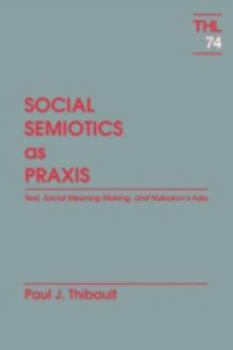Social Semiotics as Praxis
Select Format
Select Condition 
Book Overview
In Social Semiotics as Praxis, Paul J. Thibault rescues semiotics from terminal formalism by recognizing that the object of a semiotic inquiry is necessarily the way in which human beings, individually and collectively, make sense of their lives. Focusing on Vladimir Nabokov's Ada, he develops a conception of social semiotics that is a form of both social action and political praxis.
Thibault's principal intellectual sources are, among others, Bakhtin, Volosinov, Derrida, Foucault, Gramsci, Habermas, and Halliday. Thibault combines the work of Halliday in particular with is own theories of semiotics to explore the dynamics of quoting and reporting speech and to develop a critique of the categories of "self" and "representation." Thibault accounts for the meaningful relationships constructed among texts and elaborates on the two main themes of relational levels in texts and the dynamics of contextualization to give voice to a unifying discourse for talking about social meaning making.Format:Paperback
Language:English
ISBN:0816618666
ISBN13:9780816618668
Release Date:February 1991
Publisher:University of Minnesota Press
Length:320 Pages
Weight:1.00 lbs.
Dimensions:0.7" x 6.1" x 9.0"
Customer Reviews
0 rating





